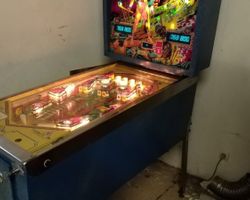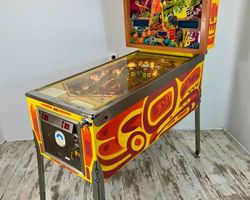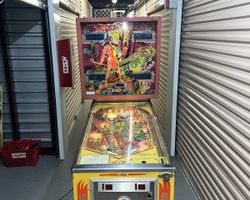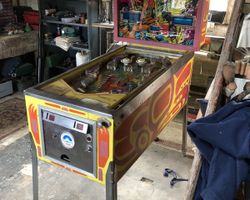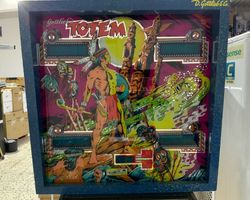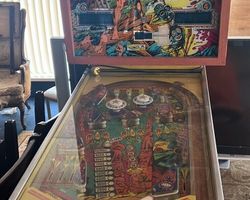Totem
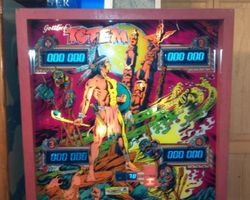
Average Prices: USD $200 to $800
Produced: August, 1979
Production Run: 6,643 units
Machine Type: Solid State Electronic
MPU: Gottlieb System 1
Players: 4
Design by: Ed Krynski
Art by: Gordon Morison
Released in August 1979, the "Totem" pinball machine by D. Gottlieb & Company stands as a testament to a transformative era in pinball manufacturing. With 6,643 units produced, this solid-state electronic marvel reflects the burgeoning technological advancements of the late 1970s. Designed by Ed Krynski and beautifully illustrated by Gordon Morison, "Totem" draws inspiration from Native American motifs, enveloping players in the rich hues and mystique of the American West.
Krynski, a renowned figure in pinball design, collaborated with Morison’s vibrant and evocative artwork to craft a machine that seamlessly blends visual aesthetics with immersive gameplay. The production process also saw innovation in playfield material, with some variations featuring fully painted MDF, adding to Totem’s distinctive character.
An interesting tidbit about "Totem" is its rear cabinet design, which includes two different paint schemes—one showcasing two "dots" and a "dash," while the other has three "dots" and two "dashes." The reasons behind these stylistic differences remain a delightful mystery for pinball enthusiasts.
Signature Features and Design
"Totem" is distinguished by its asymmetrically placed flippers—a novel concept that challenges player expectations and adds a level of skill-building not often found in contemporaries. The vari-target on the left playfield captures attention for its strategic depth and contribution to scoring mechanics. Meanwhile, Morison's artwork transforms the machine into a vivid canvas of cultural expression, celebrated for its aesthetic appeal while occasionally critiqued for verging on dated or culturally insensitive themes.
These features not only set "Totem" apart but also enrich the overall game experience, inviting players to engage with the machine on multiple sensory levels.
Playfield and Mechanics
The playfield of "Totem" features a thoughtful arrangement of drop targets—two banks of three—and a prominent kick-out hole. The vari-target offers a nuanced layer of challenge, rewarding precision and timing. Such elements establish an engaging flow, blending strategic shots with reactive play.
Artistically, the playfield bursts with Morison's dynamic visuals. Unlike many machines of the era, these playfields are completely painted, eliminating areas of unadorned wood and thereby enhancing visual engagement. The strategic placement of pop bumpers and a manual plunge type creates a balanced and rhythmically-tuned environment for players to lose themselves.
Gameplay Dynamics
The gameplay of "Totem" revolves around mastering its asymmetrical flippers and capitalizing on scoring opportunities provided by the drop targets and vari-target. The scoring system offers bonus multipliers tied to these elements, encouraging players to develop unique strategies aimed at maximizing points.
Players often delight in the challenge presented by targeting specific shots to activate bonus modes. Though some find prolonged gameplay monotonous, others appreciate the nostalgic callbacks to simpler pinball dynamics where skill overcomes mechanical complexity.
Noteworthy strategies involve prioritizing the drop targets for score multipliers while simultaneously managing the angle challenges posed by asymmetric flipper placement—a divisive but engaging feature that sets dedicated players apart from casual participants.
Reception and Legacy
Upon its release, "Totem" received mixed reviews. Critics and enthusiasts alike praised its captivating artwork and innovative asymmetrical design—and yet others expressed frustration at these same elements or desired deeper mechanics akin to more complex machines. Its audio capabilities, notably featuring the second-generation sound card in Gottlieb System 1 games, polarized opinions for showing improvement yet still lacking compared to later models.
Nonetheless, "Totem" endures as a beloved piece among collectors who cherish its blend of artistry and game design innovation. While it may not have revolutionized pinball history outright, its influence is felt in the appreciation for their cultural artistry and functional ingenuity within arcade traditions. The sentiment towards "Totem" exemplifies a cherished blend of nostalgia and critique—an emblematic slice of pinball's rich legacy.
 Active Auctions
Active Auctions
 Auction Results
Auction Results
| Cost | Location | Date |
|---|---|---|
| EUR €1,000 |  Nordrhein-Westfalen, Germany Nordrhein-Westfalen, Germany |
25 January, 2025 |
| GBP £463 |  Evesham, United Kingdom Evesham, United Kingdom |
04 June, 2024 |
| AUD $1,575 |  New South Wales, Australia New South Wales, Australia |
25 February, 2024 |
| USD $1,200 |  Texas, United States Texas, United States |
17 April, 2023 |
| USD $600 |  United States United States |
16 March, 2023 |
| USD $1,500 |  Minnesota, United States Minnesota, United States |
15 March, 2023 |
| EUR €51 |  Niedersachsen, Germany Niedersachsen, Germany |
28 February, 2023 |
| GBP £569 |  Wittersham, United Kingdom Wittersham, United Kingdom |
07 October, 2022 |
| USD $610 |  United States United States |
15 August, 2022 |
| EUR €1,111 |  Niedersachsen, Germany Niedersachsen, Germany |
27 March, 2022 |


Private Policy · Search Website · Contact Us
All trademarks and copyrighted materials remain property of their respective owners.
All other content copyright 2007 - 2025 Pinpedia.

